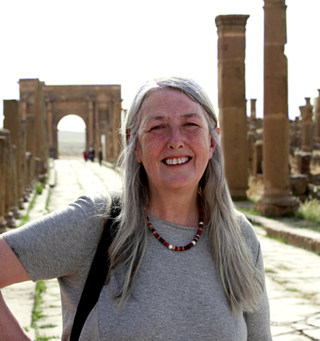
My new Roman series start on BBC2 on Wednesday at 9.00. And it's a very funny feeling, a combination of anticipation, terror and nervous recollection. For a start, my main work on this -- in terms of filming -- was done months ago, last summer, and one thing's for sure: it cant be altered now. And the criteria of success are a bit fluid. One is the critical reaction. Do the reviewers, do my colleagues, like it? Two stars or four? But there's also how many people watch. It's not much good having a great critical response if the televisions dont get turned on. I wasn't exactly delighted to discover that it has been scheduled against Masterchef on BBC1 (but it could have been worse, it could have been Bake Off.
Anyway, the title is "Mary Beard's Ultimate Rome: empire without limit". The second part has already raised a few eyebrows. How could you imply the Roman empire didn't have boundaries, when self-evidently it did? In fact, as will come clear very soon into the series, the phrase "imperium sine fine"/"empire without limit" is taken from Jupiter's prophecy for Rome at the beginning of Virgil's Aeneid; it's Rome's ideological image of itself in the first century BCE, not the actuality.
But "Mary Beard's . . . "? One of my particular hopes is that the blazoning of the name of yours truly won't stop people taking a close look at the credits and at the names of all the other people who were all involved in making the programme.
Making television is extremely hard work. I dont regret doing it for a minute. I've seen all kinds of things that I wouldn't otherwise have seen, and I've had a chance to think about things, and how you can best present them, in all kinds of different ways too. But it isn't the glamour trip that people often think, and it depends not just on some starry (or not so starry) presenter, but 100% on collaboration -- directors, producers, sound and camera, not to mention all the editors, music makers and voice-over engineer after the filming's finished, as well as the people who organise the transport, book the hotels, and fix up all the permissions to film (which sounds easy, but I promise you isnt . . . you can't always get what you want, or at the price you can afford to pay).
If you came on one of our shoots (I couldn't possibly know if it is the same on others), what you would notice is that everyone really is in it together, 24/7. That goes from the soundman (who has to be listening to everything) saying gently on more than one occasion, "Mary, did you really mean to say...?" (or indeed "Mary, I dont actually think it's bronze..." whoops!), to the arguments playing out almost everybreakfast, lunch and dinner about how we are going to present the site or object we are looking at, and what I am going to say to make it come alive and also fit into the argument. Of course, we have a broad route map of the programme and of the series, but no detailed, word by word, script. Intentionally so, because it's only when you get somewhere that you can really work out how to make the place 'speak' on that occasion.
So please watch, and please don't switch off as soon those final credits appear, but keep them rolling right to the end.
 newest »
newest »
 newest »
newest »
 I thoroughly enjoyed the first in the new series last night. It was as always informative, interesting and witty. Thank you.
I thoroughly enjoyed the first in the new series last night. It was as always informative, interesting and witty. Thank you.




